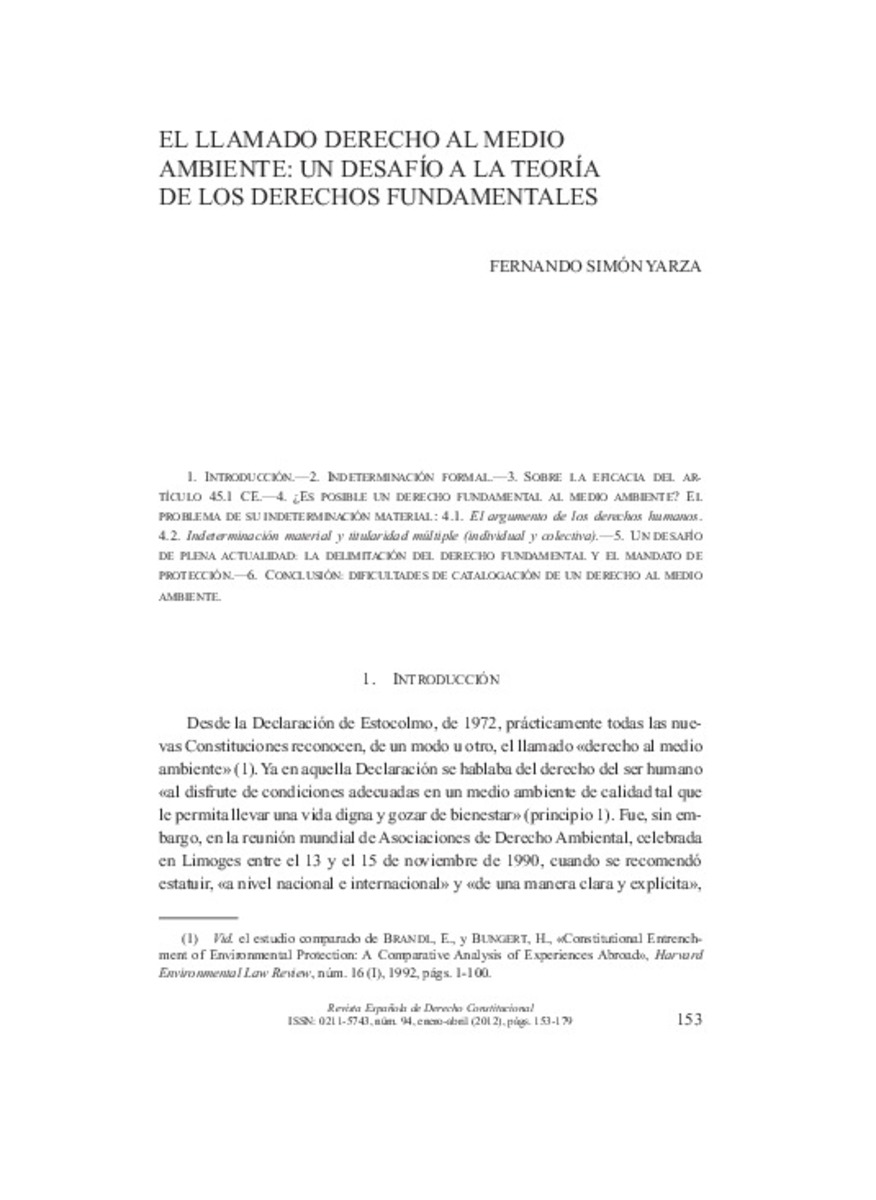Full metadata record
| DC Field | Value | Language |
|---|---|---|
| dc.creator | Simón-Yarza, F. (Fernando) | - |
| dc.date.accessioned | 2014-02-18T13:49:24Z | - |
| dc.date.available | 2014-02-18T13:49:24Z | - |
| dc.date.issued | 2012 | - |
| dc.identifier.citation | El derecho al medio ambiente como desafío a la teoría de los derechos fundamentales, Revista Española de Derecho Constitucional, 94 (enero-abril 2012), pp. 153-179. | es_ES |
| dc.identifier.issn | 0211-5743 | - |
| dc.identifier.uri | https://hdl.handle.net/10171/35232 | - |
| dc.description.abstract | Desde la Declaración de Estocolmo (1972), prácticamente todos los textos constitucionales incluyen algún tipo de previsión ambiental. Ninguno admite, sin embargo, un auténtico derecho individual al medio ambiente como tal, esto es, un poder inmediatamente invocable para proteger el entorno natural. Se trata de algo comprensible, si se tiene en cuenta que el «medio ambiente» es, en términos generales, un bien colectivo. Su protección no se puede llevar a cabo desde el status libertatis que configuran los derechos fundamentales, sino que ha de hacerse desde un status procuratoris, categoría que no se corresponde con el reconocimiento de un derecho individual. Son los poderes públicos quienes han de decidir qué técnicas resultan más apropiadas para garantizar el cuidado del medio ambiente. Un derecho fundamental a la naturaleza poseería un efecto distorsionador, puesto que trasladaría la decisión política al ámbito del proceso judicial, donde los intereses de un solo individuo quedarían sobredimensionados. ---------------------------------------------Ever since the Stockholm Declaration (1972), practically all Constitutional texts include environmental regulations in one form or another. None, however, admits a true individual right to the environment as such, that is, an immediately invocable power to protect the natural world. The absence of such a power is perfectly understandable if we consider that the «environment» is, broadly speaking, a collective asset. Its protection cannot be carried out from the status libertatis that constitutional fundamental rights draw up, but only from a status procuratoris, a category that is not in complete correspondence with the entitlement of an individual right. It is the political authorities who must decide what techniques are most appropriate to guarantee environmental care. A fundamental right to the «natural world» would only have a distorting effect, as it would move the political decision to the area of litigation, where the interests of the individual would be inflated. | es_ES |
| dc.language.iso | spa | es_ES |
| dc.publisher | Centro de Estudios Políticos y Constitucionales | es_ES |
| dc.rights | info:eu-repo/semantics/openAccess | es_ES |
| dc.rights | info:eu-repo/semantics/openAccess | es_ES |
| dc.subject | Materias Investigacion::Derecho::Sistema constitucional y judicial | es_ES |
| dc.subject | Protección del medio ambiente | es_ES |
| dc.subject | Derechos fundamentales | es_ES |
| dc.subject | Derechos morales | es_ES |
| dc.subject | Derechos humanos | es_ES |
| dc.subject | Derechos individuales | es_ES |
| dc.subject | Bienes colectivos | es_ES |
| dc.subject | Status libertatis | es_ES |
| dc.subject | Status procuratoris | es_ES |
| dc.subject | Separación de poderes | es_ES |
| dc.title | El llamado derecho al medio ambiente: un desafío a la teoría de los derechos fundamentales | es_ES |
| dc.type | info:eu-repo/semantics/article | es_ES |
Files in This Item:
Statistics and impact
Items in Dadun are protected by copyright, with all rights reserved, unless otherwise indicated.






